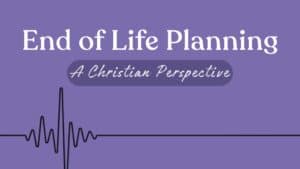“A person’s days are determined; you have decreed the number of his months and set limits he cannot exceed.” —Job 14:5 (NIV)
Conversations with loved ones about the end of life can be difficult and are often met with resistance. However, once the topic is broached, those conversations can be a time to talk about values, goals and life going forward. In a way, those discussions are also a gift: an opportunity to share words of love, gratitude and forgiveness. Expressions along these lines can bring about needed and life-giving peace.
But how do you open the discussion? Rob Moll, author of The Art of Dying, says, “You don’t want a conversation that’s very black and white, and strictly around dos and don’ts. You want a conversation around values, things that are important to them.”
The following questions may help you and your parent(s) discuss a terminal diagnosis and end-of-life care. To begin with, make sure the setting is private, and prepare yourself spiritually.
- Ask your parent what she knows about her condition. “What have the doctors told you?” “What do you understand?”
- Ask how your parents are coping with the news. Use short sentences, and listen carefully.
- Allow for any kind of emotional response.
- Ask questions like “What is most important to you now?” “What are your goals?”
- Help them make a plan, or simply do the research for them.
- Most of all, pray together and cry together, and make a commitment hang in for the long haul. You’re the child, but it may be time to care for them.*
If you discuss these topics as a family — each person stating his or her own wishes — it may help elderly parents to not feel singled out.
This may also be an appropriate moment to suggest that your parents contact their doctor and authorize him or her to share medical information with you. Two or three minds on the case are better than one. And if the illness has the potential to progress rapidly, you might offer your service as a healthcare proxy (essentially assuming medical power of attorney) for your parent. This process involves a legal document that enables you to make decisions regarding a parent’s care if she is no longer able to make them herself.
Getting the latest information directly from your parents’ doctor is extremely valuable. Dr. John Dunlap, a physician and author of Finishing Well to the Glory of God, suggests that adult children use the discussions with their parents’ doctors to “define the prognosis, the diagnoses and treatment options — and the potential for success and how that success is defined (in terms of quality of life).” Talk about the potential side effects of various treatments, Dunlop says, along with any associated risks.
Many physicians today, including Dunlop, are concerned that using every possible medical intervention can sometimes result in a painful death or a short, debilitated life
“There are so many [treatments] done at the end of life that just promote suffering,” Dunlop says. “And do we want to do that, especially when [the patient has] only have a fraction of a percentage of survival? We can make people pretty miserable.
“Life is precious. Life is a gift from God. But that’s only one half of the equation. The other half is that what is precious in the sight of the Lord is the death of His saints (Psalm 116:15). God’s ultimate goal is that His children be with Him for eternity. We are not fundamentally made for this world. This is only a shadow of the life to come. Our future is in heaven with the Lord.”
With a little preparation and lots of prayer, conversations with family members about the end of life can help prepare a person to leave this world in peace.
* Adapted in part from Pikes Peak Hospice and Palliative Care
Navigating the emotional and spiritual landscape of end of life care can take its toll on loved ones. If you need further guidance and encouragement, Focus on the Family has a staff of licensed, professional Christian counselors available to talk with you at no charge. Just call 800-A-FAMILY (232-6459).
Focus on the Family Store resource:
The Art of Dying: Living Fully into the Life to Come by Rob Moll















